
‘Can you take the heart out of the freezer?’ read a text from my husband.
I diligently hoked through the frozen remains of the last pig we slaughtered: lungs, brawn, trotters, and tiny bags of blood. There, wrapped well against freezer burn, was the heart.
Two years ago, I wrote about our experience of raising, slaughtering and butchering our own outdoor-bred pork. I have made it available for subscribers to read here:
Reflections of a Swineherd
There is a small muscle on a pig’s back called a griskin; it is lean and difficult to locate. Pig farmers of the past took it from the carcass to the frying pan as the first fruit of their labour. It sustained them for hours of butchering, brining, and salting.
Duh Dum
Today, my husband is dissecting our pig’s heart with a group of 18 students in the Sligo Sudbury School. They will use a nasal irrigation machine to shoot jets of beetroot water into its chambers while discussing valves, arteries and veins. Then, they will press cold stethoscopes to their chests and track the rhythm of their own hearts: duh dum, duh dum, duh dum.
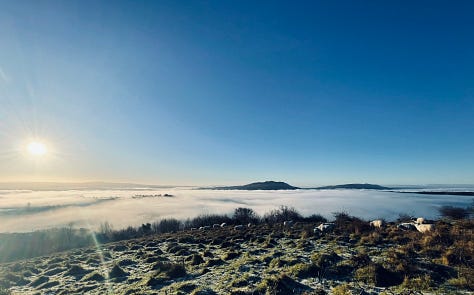
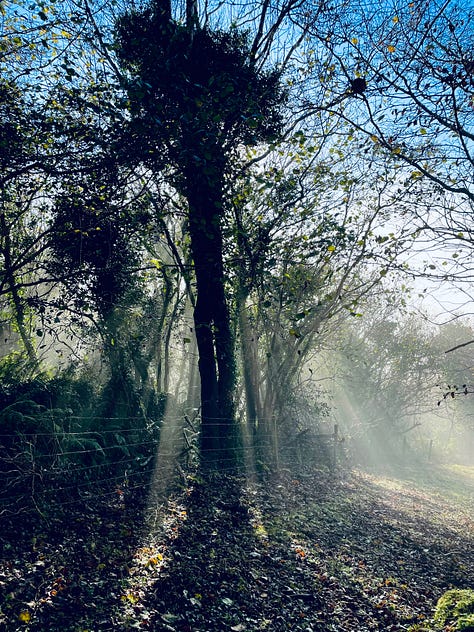
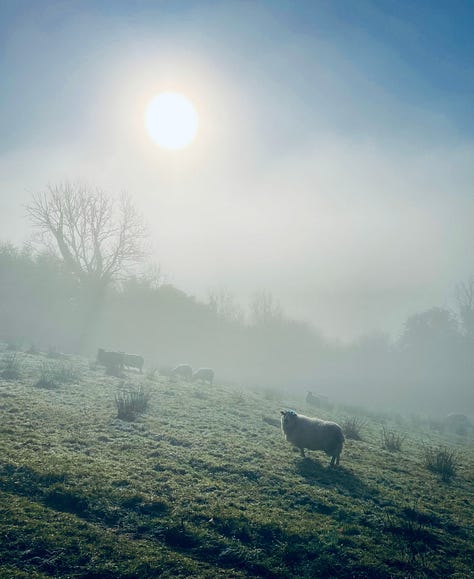
While the lessons in biology unfold, I am on a drystone wall above the clouds reading Maggie Smith’s poem Invincible. Listen to the whole thing here:
The babies made me invincible.
Even as they slept they protected me.
Even as they slept, I could stomach the dark.
She writes about those early days of motherhood, the glow of love and the suffering, the sense of invincibility that comes from being irreplaceable.
I was essential. I was too needed
in the world. That feeling was a spell
that is only now beginning to break.
I am a divil for a metaphor, but when I got the text about the heart, it read like a timely piece of advice. Take your heart out of the freezer. Because to leave the landscape of early childhood, I had to put parts of myself on ice. To quit the smallholding, move my family to Sligo, enrol my unschooled children in their first educational environment, and find my fingers on the keyboard again, required the most monumental pivot of my life.
My babies are gone, the spell is broken, we’re more than a year into our life here, and it’s time to take my heart out of the freezer. Because this season, and the landscape of pre-teen and adolescence, requires a muscular type of alchemy.
Who are we, as mothers, when we are no longer needed?
I know I am still needed, but their needs do not meet my need to be needed so neatly.
As babies, they cried, I picked them up; they woke in the night, I crawled in beside them; they fell, I kissed it better. As young children they climbed trees, I told them to go higher; they asked questions, we followed the sparks; they ran wild, I took them to the mountains. Now, their need is to be elsewhere. I am the chief facilitator of the thing they want to do next with the friends who have become so dear. It’s everything I wanted for them and more, but oh how it breaks my heart.
What they need from me now is not invincibility, it is raw, gritty realness. Because today’s essentials are soft landing spaces and engaged conversation. They need my unconditional acceptance and reminders to dig deep for the resources they don’t yet know they possess. They need a half-decent model of how to fail (I’m all over that one), manage disappointment, forgive others and cultivate healthy relationships.
Phew, I’ll need a fully defrosted heart for all that.
What I have written, I have written
I burned myself for fuel, shovelling black stones into the stove inside me.
These mornings above the mist help me see clearly. We are here for my needs too; there is only so long a mother can plunder her own resources.
This week, I went to hear Manchán Magan talk about how to rewild the mind. He has taught me so much about the spirit of this land and the Irish words, like incantations, that root me here. He spoke of the divine feminine that brooded over the land before humans set foot in her forests. We looked at mountains heaped like breasts, tombs as wombs and the rivers named after goddesses. Every culture has an origin story, and I am so late to hear mine.
Croí
I wrote a few months ago about the totem that local mythologist, Michael Quirke, was carving for me (read it here). The finished product is something I will cherish for the rest of my life. Each image is significant, connected to my craft and to the land in which I write. Each carving has a story that reaches deep into our mythological past to gather wisdom for today. This talisman sits on my desk as a reminder to have croí (heart) for the roles I play and the needs I meet.
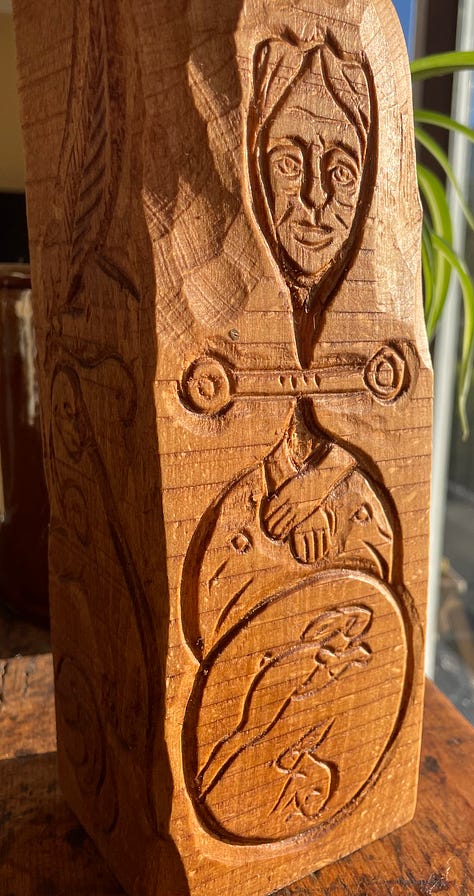
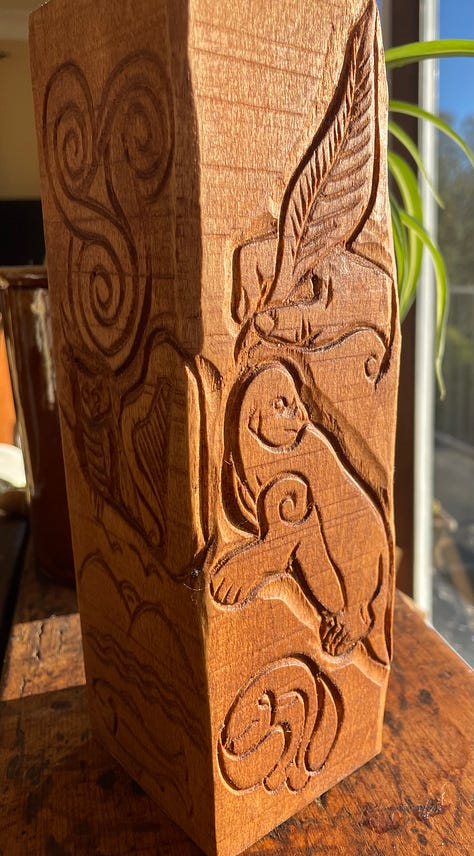

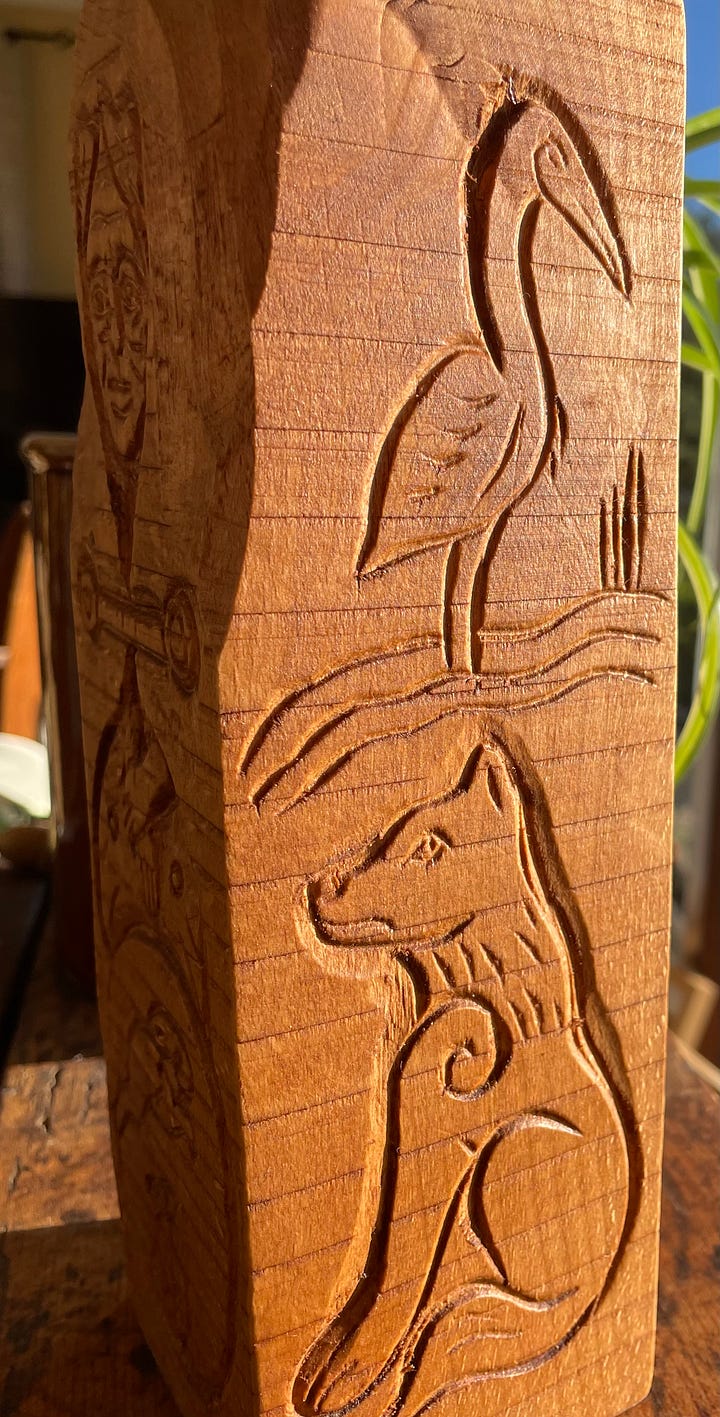

He went rogue with the quote on the top. It is a Latin phrase used by Pontius Pilate in the Bible. When Jesus was to be crucified, Pilate wrote King of the Jews on a sign. The religious leaders asked that it be changed to reflect the fact Jesus only claimed to be King of the Jews. Pilate said: Quod scripsi scripsi (What I have written, I have written).
Quirke said: “If I were to translate it into everyday talk, I’d say, ‘Suck it up’. That’s the kind of attitude you need as a writer.”
When I left the shop he shooed me out the door: “Quod scripsi scripsi, suck it up, go on and write your heart out.”
His art will be a family heirloom. I wonder at the fingers that will read its stories like braille, or the space it will occupy in the homes of my children’s children. My hope is that it connects those who come next with those who went before, reminding them where and who they are from, invoking new spells for life as they know it.




Just beautiful. And painful. If there is such a thing as reincarnation, you may be tempted to come back as your child’s friend. But you are so much more than that. You have woven truths, trust and treasures into the fabric of their lives. Sit on the bleachers and enjoy what you’ve written.